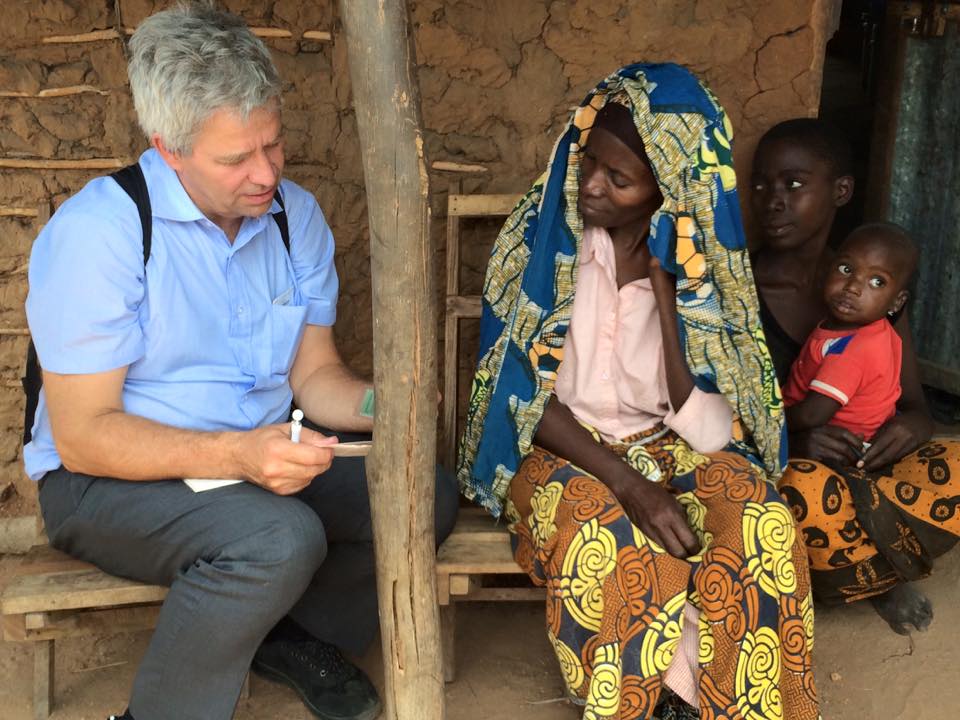“Many brilliant young professionals in Africa have decided to dedicate their lives and expertise to strengthening tax justice”
“It is old-fashioned to think that you need to send money to organisations in Washington DC or Paris, in order to be able to support Africa in tax justice matters. Direct cooperation with African countries and specialist organisations can be a much more efficient strategy,” says Timo Voipio, Programme Director of Government of Finland’s Taxation for Development action programme. Three questions about development cooperation is a series of interviews with specialists in the Ministry for Foreign Affairs.

1. Why are you working to strengthen tax systems in developing countries?
Throughout my adult life, I have been trying to figure out solutions to reducing poverty and inequality. I examined the question also in my doctoral dissertation, which I wrote by the side of pursuing my career in the Foreign Ministry. In fact, completing the dissertation took 17 years.
When I lived in remote areas in Tanzania, I understood that many poor people actually lead a good life, but the lack of social protection makes them vulnerable and cautious when it comes to taking risks. It is therefore important to develop basic social protection , which gives poor women and men the courage to seize forward-looking opportunities in life and trust that their children don’t need to suffer from hunger even if their mum and dad failed the first time round.
I've been working on these questions for the past 15 years; first as Senior Adviser on social policy in the Ministry for Foreign Affairs, then as Senior Research Manager at the International Social Security Association (ISSA) under the administration of ILO, and later as Director of the EU Social Protection Systems (EU-SPS) Programme. When I returned to the Ministry for Foreign Affairs, to my disappointment I found out that the Ministry had deprioritised social protection from among the priority sectors of Finland's development cooperation.
A new priority theme was taxation for development. I was asked if I was willing to lead the design and implementation of Finland's new Taxation for Development action programme, and I decided to tackle the challenge. The more thoroughly I have looked into the theme, the more I have learned to appreciate its importance: African countries lose more through tax evasion and other illicit financial flows than they receive in the form of official development assistance or direct foreign investments. To promote global justice, it is important that we support the strengthening of African countries’ own ability to raise taxes, companies’ tax responsibility, and Africa’s capacity to exercise influence on global taxation policy forums
2. What accomplishment in the promotion of taxation has made you happy? What discourages you?

Finland supports two excellent African networks specialising in taxation: the African Tax Administration Forum (ATAF) and the Tax Justice Network Africa (TJNA). ATAF is a cooperation organisation for African Tax Administrations. TJNA is a cooperation forum for African civil society organisations, women’s organisations and environmental and human rights organisations that follow tax policy matters.
It has been very inspiring to participate in meetings, conferences and webinars organised by these African expert networks. What has surprised me is that so many brilliant and smart young African professionals have decided to dedicate their lives and expertise to the strengthening of fair and equitable taxation.
In my earlier post as Director of the EU Social Protection Systems (EU-SPS) Programme, I experienced similar happiness when I saw how African social protection professionals embraced and took charge of the social protection leadership training programme that was designed at the request of the African Union Commission and co-financed by our EU-SPS Programme. These African experts have continued to roll-out this training programme, even after our funding period expired, and the programme is now actively used in half of the countries of Africa continent in English, French, Portuguese, Arabic and Swahili.
It is a bit depressing to note that some donors seem to think that supporting Africa in tax matters would be possible only by sending development aid funds to international organisations based in Washington DC or Paris, in the expectation that they could then take action on behalf of Africa. This is an extremely old-fashioned approach. By supporting African partners and organisations based in Africa, we can strengthen Africans’ own capacities on taxation and social protection and create opportunities for them to raise their voice in influencing global tax policy making. This way the number of African policy-makers, public officials, active citizens, researchers and journalists, who are familiar with the key tax and social protection questions mean, will grow, and taxation may gradually be conceived in Africa as a key pillar – even a popular element – of a well-functioning society like it is in Finland.
I’m also very happy that the European Commission and the African Union have warmly welcomed the idea, presented by Commissioner Jutta Urpilainen and Minister Ville Skinnari at the publication event of Finland’s Taxation for Development action programme in June, that Finland would join Team Europe in the new EU–African Union tax partnership.
3. What would you like to say to those who think that corruption and tax evasion are so deep-rooted problems in developing countries that it is impossible for them to establish well-functioning tax systems?
The biggest problems caused by tax evasion are not in developing countries but in the industrial countries that serve as tax havens. The UK, the Netherlands, Switzerland, Luxemburg, Ireland, Singapore and Hong Kong – including large companies – keep gathering profits from tax evasion while the expenses are paid, for example, by Finland, the other Nordic countries and the majority of African countries. African and Nordic countries have common interests in global tax policy questions, and we have a genuine opportunity to build partnerships.

We could speak on behalf of African countries in international tax negotiations, but a more sustainable solution would probably be to help the countries and the African Union to strengthen their own skills and capacities to handle tax administration and tax policy matters. In this way, Africa will be able to take advantage of the existing global rules for preventing illicit financial flows and, if necessary, to negotiate reforms for global rules if that is required to protect Africa's interest and to ensure fair play.
Tax systems and social protection systems must be developed side by side: Citizens and companies are willing to pay taxes only if they see that the government’s tax revenue leads to high-quality education, health and social services and reliable social protection, which make it possible for all members of society to make their full contribution to the development of the national economy and society. On the other hand, tax systems must be developed in order to be able to finance social protection and health and social services.”
